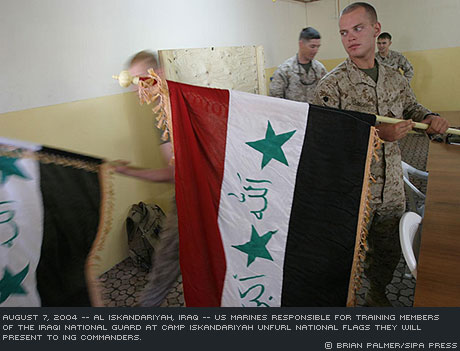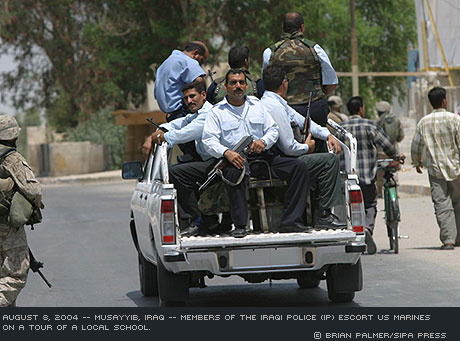|
|
The
Iraqi Police
The Marines host a weekly security meeting on base for the Iraqi Police
(IP), the national police, and the Iraqi National Guard (ING), a paramilitary
force. The Marines want the Iraqis to do things their way, on their
timetable. They want accountability -- plans, logs, and weekly statistics
-- plus punctuality, results, and firm handshakes. Local IP commanders
commit to the policies and timelines requested by their American funders,
but many don't deliver on these commitments. Still, they ask for more
and bigger weapons, air support from the USMC's helicopter gunships,
cars, appliances, radios, station improvements, and money.
At a recent security meeting, an IP Lieutenant Colonel promised to
provide police officers to staff a key traffic checkpoint for half
the day. That would free up the ING, which mans the post 24/7, for
more community patrolling, West told IP officials. "Tomorrow,"
the Lieutenant Colonel responded firmly through a translator. "Tomorrow?"
asked West, a Beverly Hills, CA, police officer when not serving with
the USMC. "Yes," the Lieutenant Colonel confirmed with a
nod, his men will be at Checkpoint 3 tomorrow.
Sunday afternoon at 16:30 there were no IP officers at the checkpoint.
West queried a sweaty ING grunt at the post, who told West the police
officers never showed up. They didn’t show up the next day, either.
Or the one after.
The Marines bristle at this resistance to accountability and apparent
flakiness." You probably don't want to write this, but they're
like kids," said one officer. These Marines attribute this behavior
to a perceived flaw in the Iraqi character. "It's a culture where
you don't get an answer of yes, you don't get an answer of no. It's
Inshallah."
Iraqi Muslims, like most devout believers in Islam, punctuate references
to future events with the word Inshallah, God willing. I will see
you on Wednesday, Inshallah. If God sees fit to deliver mortals another
Wednesday, then the meeting will happen. It's a routine acknowledgment
of one's humility before their maker – and one’s relative
powerlessness -- but that's not how many of the Marines I have spoken
to view it.
Some Iraqi Police officers are brave, some aren't, but all are struggling
to survive in a tremendously dangerous and unstable environment --
an environment neither the Marines, who have been here only since
mid-July, nor the US Army, which was here for 11 months, have been
able to pacify. Police stations are stormed and mortared; checkpoints
are bombed and shot up. IP officers are attacked with stunning frequency
by the anti-US forces that view them as traitors. The Lieutenant Colonel's
predecessor, a police chief the Marines praised for his courage and
aggressiveness, was assassinated a little over a month ago. Another
police chief in the area was decapitated. Anti-US forces threaten
the families of IP officers. Cooperation with the Americans can bring
benefits, but it also has a steep downside.
Commitment
As earnest and committed as many Marines are, their presence is fleeting.
The Marines can tabulate the numbers of mortars seized and IEDs defused
-- and they have had successes in these areas -- but they have few ways
to gauge the impact of their "security and stability" operations
upon average citizens because they have little contact with them. They live on
a distant base inaccessible to average Iraqis, not in town. Less than a handful
speak Arabic, and most know next to nothing about Iraq's culture.
Marines are trained to fight, to destroy, and then to leave, not to
spread cross-cultural understanding and democracy. "That's not what
they signed up for, that's not what they learned in boot camp, and that's not what
the recruiter told them," a junior officer explained.
The Marines, my hosts, conduct many missions every day
that I know nothing about that may be contributing to security. But
I have seen the net results of the Operation Iraqi Freedom II, the name for
this American-led postwar effort, on the streets of Iskandariyah, Musayyib,
and Al Sadr City. These are insecure and unstable places, with pockets
of calm. Change takes time, officers remind me. But time runs out on this phase
of the experiment in nation building at the end of the year. The US is
scheduled to hand over "civil control" to Iraq's nascent
government. Here in north Babil, the Marines plan to pull back from grassroots governance
and community policing-type work they perform and hand over those tasks
over to the local bodies they are supporting.
"We all believe that we're doing the best that we can, and something
is better than nothing," said CAG's Major West told me at the end
of a long and difficult day. |
 |
| During
the evening the Mahdi Army surrounded the Haswah
Police Station, the most heavily fortified among the six in the 24th
MEU's area of operation. The five Iraqi Police officers manning the
station ran away. The band of fighters -- the Marines estimate 20
to 30 -- convinced the ten Iragi National Guard soldiers on duty at the
station to surrender their weapons and their uniforms. The militia
men then blew up the police station. Neither the ING or the IP officers,
allies of the American forces, fired a shot. |
 |
 |
|


